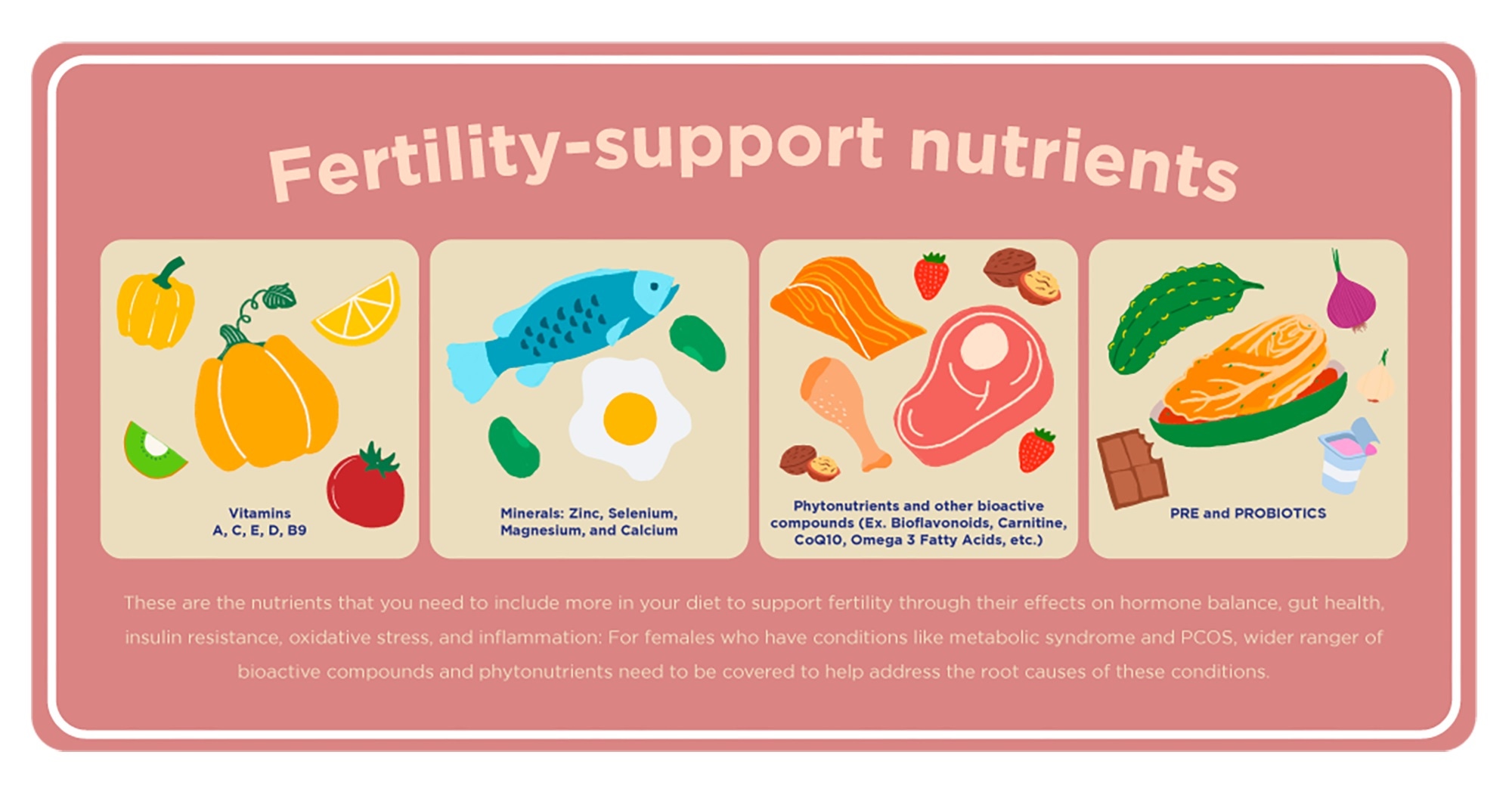
What To Eat to Get Pregnant Faster
By Mabelle P. Aban, RND, RN, CPT
What if I tell you that you can influence your ability to successfully conceive, and your day-to-day decisions about what to eat and how you live can partly determine how healthy your future child will be, up to the time that he grows up as an adult?
Wouldn’t you grab this opportunity that involves optimizing your nutritional status, improving food choices and ensuring appropriateness of the amounts and proportions of the nutrients in your diet?
Let’s talk about FERTILITY and PRE-CONCEPTION STAGE
This concerns you ladies and gents who are planning to have a baby. Along with other considerations, you need to support your body’s ability to conceive children. While the foundations of good nutrition should be built during the early stages of life, individuals in their reproductive age should be mindful of their diet’s nutrient density, quality, portions and proportions.
Inappropriate amounts (excessive or insufficient) can affect a person’s nutritional status. Underweight, overweight, or obese nutritional status can affect an individual’s fertility, outcome of pregnancy and the health of the offspring. For instance, babies born with high or low birth weight are at higher risk for obesity and chronic diseases.
As an overview, a healthy, well-planned diet should be composed of:
- Whole, high fiber grains
- Both animal and plant-based protein
- Plant-based oils (from olives, nuts, seeds, avocado, etc.)
- Targeted sources of vitamins, minerals and phytonutrients
Make sure that your diet is dense with phytonutrients and targeted set of nutrients that can fuel fertility:

Note that for males, we target the various factors that may affect fertility such as gut health, hormone balance, insulin function, inflammation and oxidative stress. This is why gut support, anti-oxidant and anti-inflammatory nutrients shown above are important. Different male fertility issues are associated with low intake of fiber, zinc, magnesium, calcium, copper, and selenium; including a high fat diet and excessive consumption of red meats.
For reproductive health, there are also certain food items that you need to stay away from, as these negatively affect gut health, weight and body composition, while some are toxins that can interfere with hormone balance & other body functions:
- Highly processed foods and junk foods
- Simple sugars and refined carbs
- Deep-fried food items and other sources of transfats
- Excessive coffee and alcohol intake
- Toxin exposures (heavy metals, plastics, tobacco smoke, etc.)
Understanding PREGNACY and INTERCONCEPTION CARE
Successfully conceiving is just the start of the journey. Next crucial goals are focused on optimizing health and well-being of a woman during pregnancy, as well as the birth outcomes & health of the future child.
How you take care of yourself after or in between pregnancies (also known as interconception care) also matters. For example, a mother who retains gained weight from pregnancy is at higher risk for obesity, post-partum depression, diabetes and other chronic diseases. To also minimize health risks for the mother and baby, 3-5 yrs of birth-spacing should be maintained.
Focus on your CHILD’S FUTURE HEALTH
Recent advances show that diet and environmental factors have the ability to influence,
switch on or off genetic predispositions. If diabetes, hypertension, or certain types of cancer run in your blood, this is not an absolute “life-sentence.” You have the power to change this by targeting and ensuring optimal consumption of specific sources of nutrients with each trimester (ex: B vitamins, especially folate; choline; essential fatty acids, amino acids, and specific phytonutrients)
Words of advice to get these life-long benefits
To the future parents out there, it’s never too early or too late to start improving your nutrition and health. For something as precious as having a family, preparing your body, your nutrition and health, is truly essential. It is vital to building and raising an individual who is optimally healthy and well.
References:
Skoracka, K., Eder, P., Łykowska-Szuber, L., Dobrowolska, A., & Krela-Kaźmierczak, I. (2020). Diet and Nutritional Factors in Male (In)fertility-Underestimated Factors. Journal of clinical medicine, 9(5), 1400. https://doi.org/10.3390/jcm9051400
Palmirotta, Raffaele & Lovero, Domenica & Silvestris, Erica. (2019). Nutrition and Female Fertility: An Interdependent Correlation. Frontiers in Endocrinology. 10. 10.3389/fendo.2019.00346.
Gunalan, et al. (2018). The effect of nutrient supplementation in the management of polycystic ovary syndrome-associated metabolic dysfunctions: A critical review. 19: 220-32
Lacagnina S. The Developmental Origins of Health and Disease (DOHaD). American Journal of Lifestyle Medicine. 2020;14(1):47-50. doi:10.1177/1559827619879694
Wadhwa, P. D., Buss, C., Entringer, S., & Swanson, J. M. (2009). Developmental origins of health and disease: brief history of the approach and current focus on epigenetic mechanisms. Seminars in reproductive medicine, 27(5), 358–368. https://doi.org/10.1055/s-0029-1237424
Swanson, J. M., Entringer, S., Buss, C., & Wadhwa, P. D. (2009). Developmental origins of health and disease: environmental exposures. Seminars in reproductive medicine, 27(5), 391–402. https://doi.org/10.1055/s-0029-1237427
Associate of State Public Health Nutritionists. Preconception Health: The Role of Nutrition. December 2015. https://asphn.org/wp-content/uploads/2017/10/Preconception-Health-The-Role-of-Nutrition.pdf









